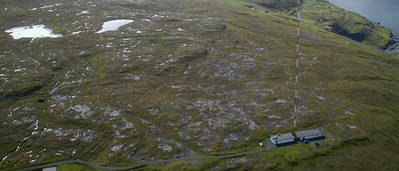The Ejde Loran station on the Faroe Islands will be shut down on December 31, 2015, after having been in operation since 1959. At the end of the year, the entire European Loran system will be discontinued.
The Loran-C station on Ejde is a part of the Northwest European Loran system, consisting of four stations in Norway, two in France, one in England, one stationin Germany as well as the station on the Faroe Islands. Loran-C is a radio navigation system that can be used for navigation and the receipt of time information if you have a Loran-C receiver.
Since 2006, the Ejde Loran station has been financed by France, which wanted to continue the operation of the Loran-C system after Denmark had left the Northwest European Loran-C System (NELS) in 2005.
The U.S. and Canada shut down their Loran-C stations back in 2010, and now Norway, France, England, Germany and also the Danish Maritime Authority (Denmark) have decided to shut down their stations at the end of 2015. This means that the entire European Loran system will be shut down at the end of the year.
Since the emergence of satellite navigation (including GPS), the Loran stations have lost their importance as means of navigation, the Danish Maritime Authority said. The number of users fell drastically in 2000 after the U.S. had cancelled the so-called SA code from the GPS signals. This led to a higher degree of positioning accuracy and, thus, the need for the Loran stations as a means of navigation was not nearly as large as it had been.
The Loran station on the Faroe Islands has been in operation since 1959 and had around 32 members of staff during the first years. However, over the years modernizations and automations have resulted in personnel reductions so that, by now, only two employees of the Danish Maritime Authority are responsible for the operation of the station. After the shutdown, one of the two employees will continue to work at the regional office on the Faroe Islands.
In addition to the operation of the Ejde Loran station, the Danish Maritime Authority operates 26 Faroese lights as well as a Differential GPS (DGPS) station in Torshavn. The DGPS station transmits corrections to the GPS signals, thus achieving a higher degree of positioning accuracy, just as DGPS users will be warned in case of GPS system failure.














